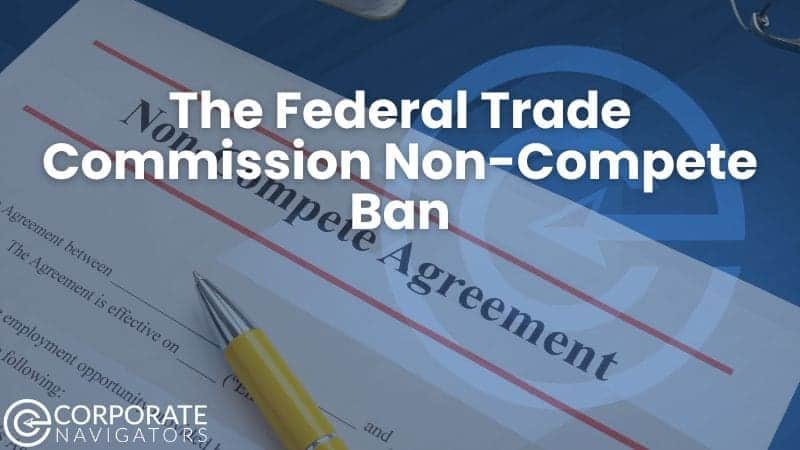
What the Federal Trade Commission’s Attempted Ban Contained
Earlier this spring, the FTC made a ruling that could have impacted many businesses: making most non-compete agreements non-enforceable. In short, it would have retroactively invalidated millions of existing non-compete agreements.
If this rule came into effect, 30 million employees would no longer have been bound by non-compete clauses, eliminating any legal consequences for joining a direct competitor. That’s one in five workers, which can vastly change the recruitment landscape.
There were some exceptions for senior executives in policy-making positions and other individuals, but overall, this proposed rule would have made it possible for most workers to be free of their non-compete’s restrictive covenants.
Before the ruling could become final in September 2024, it was challenged in three U.S. courts and was struck down on August 22, 2024.
A Victory for Businesses: Latest Updates on Litigation
On May 7, 2024, the Federal Trade Commission made a final rule prohibiting most non-compete agreements that stop “workers” from seeking or accepting employment in the United States or from operating a business related to a direct competitor. Overall, the FTC has decided that non-competes are an “unfair method of competition.”
Currently, state laws govern non-solicitation and non-compete clauses because they are contracts. Therefore, different states have taken their own approaches to the issue, with some states limiting them (e.g. California) and others allowing them (e.g. Florida). However, with non-competes potentially going under Federal regulation, this new “rule” will supersede all state laws governing non-competes.
This ruling has faced some opposition. On April 25, 2024, ATS Tree Services, LLC v. Federal Trade Commission challenged the FTC’s non-compete ban. Judge Kelley Brisbon presided over this case in the U.S. District Court for the Eastern District of Pennsylvania. She issued a decision on July 23, 2024, favoring the FTC. In the ruling, Brisbon said that the FTC has the legal authority to issue “procedural and substantive rules as is necessary to prevent unfair methods of competition.” So, this case won’t block the ban.
In addition, plaintiffs Ryan LLC and the United States Chamber of Commerce sought an injunction against the FTC’s Non-Compete Ban Rule in the case Ryan, LLC vs. FTC. On July 3, 2024, the U.S. District Court for the Northern District of Texas temporarily blocked the FTC’s ruling. On August 22, 2024, the Texas Federal Court issued a nationwide injunction on the non-compete ban, officially blocking it from taking effect on September 4, 2024 as initially planned.
What happens now?
The court’s decision represents a victory for businesses that use non-compete agreements to safeguard trade secrets and investments in their employees. It confirms that current non-compete clauses remain valid and allows both companies and employees to enter into new agreements.
However, this is a disappointment for worker advocates who contend that these agreements unfairly limit employees’ job mobility and wage negotiations. The FTC is expected to appeal this ruling to the Fifth Circuit Court of Appeals, but for the moment, the rule is paused from going into effect.
Exceptions to the Proposed Rule
The proposed non-compete clause rule mainly pertained to workers who earn less than $151,164 per year. It doesn’t cover senior executives in “policy-making positions” who earn more than $151,164 annually.
Noncompetes for senior executives that are already in place can remain in force, but employers aren’t allowed to form or enforce any new agreements, even for senior executives. Also, this rule doesn’t apply to workers on “garden leave” or receiving “severance” pay on a pro-rata basis.

What if the FTC Appeals and the Ban Goes into Effect in the Future?
With the possibility an appeal in our nation’s future, many experts and professional organizations have expressed their opinions on the ban’s potential impact on employers. Here are a few of their insights.
1. There Will Be a “Hot War for Talent”
According to Worklife and other similar sources, this non-compete ban could “spur an incredibly hot war for top talent.” With little to no obstructions to job hopping, high-level staff can switch over to competitors without any consequences. Or, they can start their own business in the same industry.
In this landscape, proactively having a pre-known, pre-qualified talent pipeline on standby will allow you to be more flexible and agile in filling any potential role vacancies. At Corporate Navigators, we can source and develop candidates over and above your “open positions” so you will be ready to address future talent needs, whether you need to fill a specific gap or grow an entire division. You should keep a pool of known pre-qualified talent on standby to minimize your time to fill.
2. A Greater Need to Protect Secrets
When workers have the freedom to move to a direct competitor, they can use what they know to benefit their new employer instead of you. This will force companies to be more creative about how to retain secrets. To accomplish this, employers can look into non-disclosure agreements (NDAs) and consult a legal professional about trade secret laws and how to implement them to protect sensitive information.
3. Employers Can Expand Their Candidate Pools Too
If employees aren’t bound to a non-compete, you also have an opportunity to attract top talent. Therefore, you can potentially turn a disadvantage into something that can work in your favor. Corporate Navigators can source candidates on your behalf.
4. A Greater Need to Increase Employee Loyalty
If you increase employee loyalty, they are more likely to stay. Offer incentives and a healthy work environment for starters. Incentives can come in the form of higher compensation packages or offer perks like clear growth opportunities, continued education, flexibility, paid lunches, excellent healthcare, 401k plans, and more. Listening to employee complaints and resolving them fairly and offering flex work options can also heighten employee loyalty.
What does everyone think about the proposed non-compete ban?
Thoughts on the federal ban on American non-compete clause rules range from “amazing” to “terrible” depending on who you ask.
The Federal Trade Commission
Lina Khan, the FTC’s Chair, says that “Noncompete clauses keep wages low, suppress new ideas, and rob the American economy of dynamism, including from the more than 8,500 new startups that would be created a year once noncompetes are banned. The FTC’s final rule to ban non competes will ensure Americans have the freedom to pursue a new job, start a new business, or bring a new idea to market.”
The Joint Letter
Following the ruling, over two hundred Associations and Chambers of Commerce from different states joined hands to write a joint letter to the FTC in opposition to the commissions rulemaking. Here is an excerpt of their letter:
“We strongly oppose the proposal because noncompetes serve vital business and employee interests and because the FTC lacks legal authority to issue the proposed rule. Most importantly, noncompetes serve pro-competitive interests.
“Courts, scholars, and economists all have found that noncompetes encourage investment in employees and help to protect intellectual property. In every sector of the economy, employers rely on noncompetes to protect investments in their workforce, to protect trade secrets and other confidential information, and to structure their compensation programs.”
Bloomberg Law
In contrast, Bloomberg Law advises a “watch and wait” approach, as much of the final decision-making is still up in the air. Here is a quote from its opinion article on the subject:
“While the FTC’s noncompete ban represents a major change to fair competition law that could have major effects on businesses small and large, it seems unlikely that this rule will have any immediate impact in the short term. So, businesses should be reticent to take immediate steps to begin complying with the rule’s requirements. Instead, they would be wise to monitor the ongoing legal challenges to know when and if compliance will be required.”
Harvard Business Review
Harvard Business Review takes a different approach and argues that the Federal Trade Commission’s ban on non-compete agreements “long overdue”. Its article explains how the ban is a necessary and delayed action, contending that such agreements stifle competition, limit job mobility for workers, and hinder innovation. The ban is seen as a positive step towards promoting more fair employment practices and fostering a more dynamic and competitive labor market.
What do you think?
The FTC’s attempted ban on non-compete agreements has sparked diverse opinions, with proponents arguing it will boost innovation and job mobility, while opponents claim it undermines business protections and investment in employees.
As this issue continues to unfold in courts, it’s crucial for stakeholders—employers, employees, and policymakers—to consider the broader implications and share their perspectives on how best to balance competition and worker rights in the evolving labor landscape.
At Corporate Navigators, we believe it’s important for businesses to be ahead of any possible changes. In light of the FTC prepping to appeal the injunction, it’s even more important to source talent today so you have the pre-screened candidates in your back pocket to be agile in case it goes into effect in September.
What’s your take on this potential shift in employment law? Do you agree that having a talent pipeline is important as a proactive measure? If you do, let’s get started today. Simply fill out the form below.



